|
|
|
Sort Order |
|
|
|
Items / Page
|
|
|
|
|
|
|
| Srl | Item |
| 1 |
ID:
174139
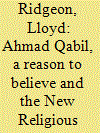

|
|
|
|
|
| Summary/Abstract |
Ahmad Qabil (d. 2012) was a mid-ranking seminarian who achieved considerable fame in Iran due to his foregrounding of reason in his jurisprudential writings, his opposition to both the strict ‘literalist’ version of sharica law propounded by the authorities in the Islamic Republic and the authoritarian regime of Ayatollah Khamenei, and for his 2004 fatwa which permitted women the choice about head covering (hijab). His commitment to reason and justice meant that his political and jurisprudential compositions and activities cannot be divorced from each other; rather, they developed in symbiotic fashion. Largely ignored by Western scholars, this article examines Qabil’s contribution to the so-called ‘New Religious Thinking’ movement in Iran. His writings and activities are significant because the reason-driven approach reflects an attempt to navigate a path based on sources within the Islamic jurisprudential tradition towards ‘universal’ standards that are common in the West, and thereby avoid the accusations of ‘cultural erosion’ through intellectual borrowing from the West.
|
|
|
|
|
|
|
|
|
|
|
|
|
|
|
|
| 2 |
ID:
174140
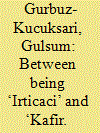

|
|
|
|
|
| Summary/Abstract |
This article engages with Kurdish ulamas’ and shaykhs’ relatively unknown narratives on manipulative shaykhs as a legitimate part of the story of Kurdish national history. The criticism against yalancı, fake, shaykhs from within the religious class is not encountered very often in Kurdish nationalist history writing. The stereotypical and generalizing approach to shaykhs in nationalist historiography hindered the diverse nature of religious class and silenced reformist discourses against the manipulation of religion. This article brings in the examples of ‘a-typical’ Kurdish ulama and shaykhs with national dreams, who delegitimized deceptive shaykhs by uncovering their deceits. As their narratives unfold, the diverse nature of the Kurdish religious class appears and the story of Kurdish nationalism becomes more complete. My findings also challenge the nationalist dichotomy that national and religious identities are exclusive of one another.
|
|
|
|
|
|
|
|
|
|
|
|
|
|
|
|
| 3 |
ID:
174145
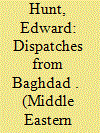

|
|
|
|
|
| Summary/Abstract |
When the dissident media group WikiLeaks published more than a quarter-million US diplomatic cables from 2010 to 2011, it included thousands of cables written by US diplomats involved in the War in Iraq (2003–2011). Although the scholarly literature covers many aspects of the war from the perspective of US officials, it has largely excluded the viewpoints captured by the WikiLeaks cables. In this article, I use the cables to reveal the thinking of US diplomats during one of the most violent phases of the war, the sectarian war, which peaked from 2006 to 2007. The cables document the sectarian cleansing of Baghdad from 2006 to 2007 and provide new information about the factors that caused the rise and fall of sectarian violence. The cables show that US actions contributed to the sectarian violence.
|
|
|
|
|
|
|
|
|
|
|
|
|
|
|
|
| 4 |
ID:
174141
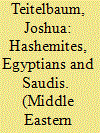

|
|
|
|
|
| Summary/Abstract |
Most analyses of the fate of the Hijaz and the Muslim pilgrimage after the First World War have focused on the struggle between Hashemites and Saudis. But in actuality the Egyptians were heavily involved in this dispute, for the Hijaz had been for centuries part of a geopolitical system based on the Red Sea littoral states. Indeed, this was a tripartite struggle, which afforded much more room for maneuver than a simple bilateral one. This article covers the maneuvers of all three parties, demonstrating how they tried to gain possession of the hajj, and all that meant for world Islamic leadership.
|
|
|
|
|
|
|
|
|
|
|
|
|
|
|
|
| 5 |
ID:
174144
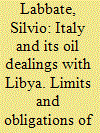

|
|
|
|
|
| Summary/Abstract |
The strategic importance of Libya to Italy’s energy interests has been a constant feature of Italy’s attitude towards the republican regime which was recognized on 1 September 1969. This followed a tradition already well established by Ente Nazionale Idrocarburi’s (ENI) actions and, even earlier, by the presence of numerous Italians going back to the colonial period. However, Italy’s need for oil often clashed with the complex and changing personality of Gaddafi and created a relationship that was constantly at risk. The Italian government and ENI often found themselves in great difficulty because of the inconvenient demands of the Arab leader. The purpose of this article is to examine the development of this difficult oil relationship, focusing attention on both the 1970s and 1980s. There is a wealth of Italian literature on this subject but most of the studies examine only the start of the 1970s and the oil crisis of 1973. Although scholarly works reassessing this topic in English are rather limited, there exists an important international literature on Libyan history and the oil issue. New documentation now available at the Giulio Andreotti Archive of the Luigi Sturzo Institute Historical Archive makes it possible to complete this earlier research and to analyze the later years. Andreotti was the leading actor in the relationship with Gaddafi during the 1970s and 1980s and, in general, he was the most powerful and prominent Italian politician at least until the late 1980s. Consequently, this article mainly uses the unpublished documents of the Giulio Andreotti Archive and documentation from ENI’s Historical Archive. Thanks to these sources, it now appears possible to reconstruct in greater detail the decisive moments of the Italian–Libyan collaboration. The article, by retracing the key moments of this difficult relationship from the point of view of oil issues and examining in depth the complicated events of 1970s and 1980s, aims to highlight both the importance of energy supplies for Italy and the role played by both ENI and Andreotti in an attempt to maintain Italian oil interests in Libya.
|
|
|
|
|
|
|
|
|
|
|
|
|
|
|
|
| 6 |
ID:
174142


|
|
|
|
|
| Summary/Abstract |
This article argues that mass protests across the Rif are rooted in the region’s socio-economic marginalization and historical and contemporary violence inflicted by the Moroccan state onto what constitutes an area of challenged state authority. The legacy of the heavily repressive approach of the Moroccan regime toward the region nurtured a collective memory of injustice and alienation among Rifians, which deepened their distrust in the Moroccan state. The emergence of the Hirak al-Shaʿbi (Popular Movement) in Al Hoceima province, following the death of a fishmonger crushed in a garbage truck, strengthened the irredentism of people’s activism and empowered the movement’s regionalist identity. Faced with further securitization of public space from central powers, Hirak has forged a strong autonomy from both the region’s public authorities as well as the regime’s elites, all of which has boosted Hirak’s legitimacy among activists and the region’s population. Hirak’s innovative modus operandi in accessing physical public sites has succeeded in transforming the interaction between society and public authorities and has shown that people can claim their rights to public space without the state’s prior consent.
|
|
|
|
|
|
|
|
|
|
|
|
|
|
|
|
| 7 |
ID:
174147
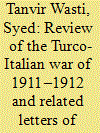

|
|
|
|
|
| Summary/Abstract |
From the time of the 1877 Turco-Russian war till its disappearance from the stage of history in 1922, the Ottoman Empire was involved in decades of almost continuous war – in Europe, on the Russian front and in the Middle East. The conflict with Italy of 1911–1912 was an example of how powers in decline are forced into war in the face of peremptory demands from stronger neighbours. Italy's unprovoked attack on the Ottoman provinces of Libya in North Africa paved the way for the Balkan Wars of 1912–1913 and indirectly also hastened the First World War. A group of Ottoman Turkish military officers along with their Arab and Berber Muslim allies in Libya made a heroic defensive stand and kept the Italian naval invasion pinned to the coastal beach-heads of Libya.
|
|
|
|
|
|
|
|
|
|
|
|
|
|
|
|
| 8 |
ID:
174146


|
|
|
|
|
| Summary/Abstract |
Sri Lanka is a small country with limited resources. Historically, its politics have been dominated by a Sinhalese/Buddhist majority. Non-alignment has been viewed as a matter of principle in foreign policy and as a means to provide for Sri Lanka’s political and economic security. Sri Lanka has had to balance its relations with the major powers and its immediate neighbours as well as Israel and its Arab and Muslim neighbours. The last relationship has been the most difficult to navigate and, at times, has had the appearance of expediency rather than consistency. Somehow, Sri Lanka has been able to navigate its way quite effectively in foreign relations, while domestic affairs have been another matter. While there are numerous studies on India’s and Pakistan’s relations with countries in the Middle East, Sri Lanka’s ties to the region have received little or no attention by scholars. This article intends to remedy the situation with a comprehensive historical examination.
|
|
|
|
|
|
|
|
|
|
|
|
|
|
|
|
| 9 |
ID:
174143
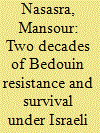

|
|
|
|
|
| Summary/Abstract |
Using archival data and newspaper collections from Britain and Israel, and extensive fieldwork interviews in the Naqab, this article breaks new ground through a critical examination of the Bedouin and their way of surviving and resisting Israeli military rule, 1948–1967. I argue that creative nonviolent resistance, everyday resistance and sumud (steadfastness and resilience), succeeded in modifying and mitigating the military rule strategies deployed by the state to control the Arab Bedouin, opening up the possibility of further political action and communal protection. By employing sumud as everyday resistance, the Bedouin improved their livelihood, strengthened one another and helped consolidate sumud, to the point where sumud became part of their culture and way of life during the military rule. Everyday sumud strategies were through border economy and contact with their relatives across the border, which utilized the strong relationships between tribes. Smuggling goods was a central form of economic survival and sumud. Everyday resistance and nonviolent actions succeeded in marginalizing military rules, restrictions, and power, allowing the Bedouin to gain immediate benefits including many of their daily needs. The Bedouin maintained their cross-border relations and continued to resist cooperation with the Israeli military rule. Hosting their fellow refugees was a daily act of sumud by the Bedouin despite the imposition of new state borders. The Bedouin also found different avenues to claim their dispossessed properties, and continued to resist Israeli confiscation of their land. They lodged land claims through every level of military rule, responding to different Israeli forms of power and the effect of domination.
|
|
|
|
|
|
|
|
|
|
|
|
|
|
|
|
|
|
|
|
|